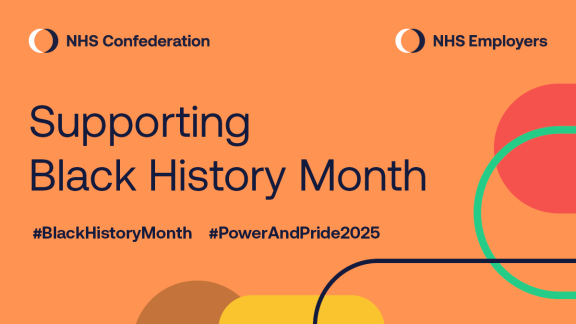Supporting Black History Month 2025

Black History Month is an opportunity to honour the achievements, history and culture of black people and their invaluable contribution to society and the healthcare system. It’s also an opportunity to connect; inspire and empower future generations.
This year’s theme, ‘Standing firm in power and pride’, highlights the importance of sharing stories of resilience, strength, and unwavering commitment to progress that defines the black community.
At a time when our black, Asian, and minority ethnic (BAME) colleagues are facing increased levels of racism, it is vital we reclaim the narrative and celebrate the crucial work they do in our organisations.
Black History Month provides an opportunity for organisations to support the campaign, raise awareness, share insights to help tackle racism and improve staff experience.
On 14 October we hosted our sell-out Black History Month evening celebration with the NHS Race and Health Observatory. Joined by Lord Victor Adebowale CBE and Baroness Sayeeda Warsi, they provided exclusive insights on what it means to be a pioneering leader from a BME background.
In our Health on the Line Podcast, Matthew Taylor, our chief executive, was joined by Dame Professor Robina Shah, consultant chartered psychologist and professor of medical education and psycho-social medicine at the University of Manchester, and Joan Saddler OBE, our director of partnerships and equality. Together, they shared their reflections on their decades of leadership, the lived realities of being among the few people of colour in senior roles, and the ongoing work to make the NHS a truly anti-racist organisation.
Joan Saddler OBE, director of partnerships and equality at the NHS Confederation said:
“As we enter Black History Month and reflect on this year’s theme of ‘Standing firm in power and pride’, we are reminded that celebration must walk hand in hand with the fight to tackle racism. While we honour the achievements of black trailblazers, we cannot ignore the rising reports of racism against BME staff working across the NHS – these reports include verbal abuse, harassment and vandalism. We must stand together and recommit to taking action towards safer workplaces for all. Each of us has a role to play in shaping a future rooted in equity, equality and respect.”
Join our BME Leadership Network
Our BME Leadership Network is a member-led network dedicated to establishing a truly diverse NHS leadership by strengthening the voice of BME communities. It aims to bring about sustainable change, so the NHS always delivers high quality universal care to all communities, by supporting members to overcome strategic and operational barriers to delivering equality.
Membership is open to both NHS BME leaders and allies, find out more information and join.
Follow the network on LinkedIn BME Leadership Network and use the hashtags #BlackHistoryMonth #PowerAndPride2025 to join the conversation.



